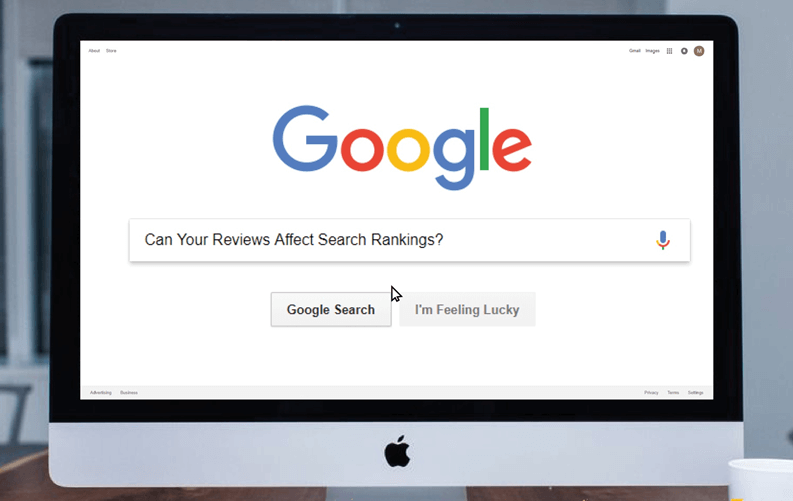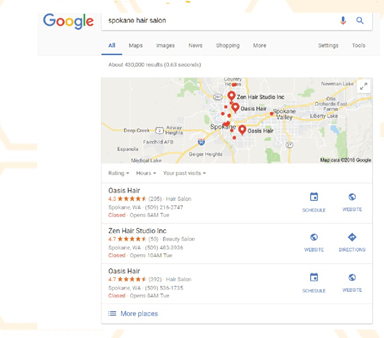
It is not surprising to know that local Search engine optimization is what to focus on when it comes to your business online. It’s very important to send Google signals – through keyword use and other SEO techniques – that your business shows that you are local, as well as it who it serves and where it is.
What you might not know is this:
Your online reviews play a direct role in your business making the cut to appear in the Google local three-pack.
In case you don’t know, that’s the collection of businesses that appear at the top of Google’s SERP when someone searches a keyword. It turns out that one of the keys to landing a coveted spot in the three-pack is getting good reviews. Here’s what you need to know.


How can anyone tell that reviews are a factor in search engine results? Google’s algorithm is proprietary and the known ranking factors (keywords, links, and Google Rankbrain, to name a few) don’t include reviews.
Local SEO experts have been saying this for a years, but it’s actually fairly easy to see that reviews are important. Google any local business category and you will get a list of results with a three-pack at the top. When you look at the businesses that made it into the three-pack, you’ll most likely see the following:
Star ratings pulled directly from online reviews of the business
Keywords in those reviews
For example, if you searched for the keyword “Spokane hair salon,” you would see reviews that related to that keyword. That’s all the proof we need to know that reviews make a difference in determining which businesses appear at the top of the SERP.
It’s also worth noting that the Local SEO Guide found that local reviews were the second most influential factor in determining search rank in their 2017 Local SEO Ranking Factors study. The influence in this study did appear to be limited to reviews that specifically included the keyword searched, but customers are likely to use the most commonly searched terms naturally.
In addition, LSI keywords that are related to the search term may also play a role. Try Googling your top keyword and looking at what’s highlighted in the reviews in the three-pack. You may notice that reviews that use semantically-related words show up even if they don’t use the precise term you searched.


There are many tell-tale signs that reviews co-inside with rankings. Reviews are closely related to the way Google’s algorithm has evolved. In the early days of the internet, it was possible to get a page to rank highly on any search engine by simply stuffing it with keywords.
That changed because it omitted any concern for the experience of a user who clicked through to a site. After all, if you could click on a site because it ranked for a keyword only to find that it was useless to your needs, you wouldn’t revisit it – and you might resent the search engine that directed you to it in the first place.
With that in mind, here are the top three reasons that Google likes reviews for SEO.
1. It trusts outside sources more than it trusts you (at least when it comes to the relevance of your site.) This first reason is related to the ongoing importance that Google places on authority backlinks. It stands to reason that it would accept mentions and references from other sources as proof that your site is relevant to certain keywords and topics.
2. Google uses written content as a way of determining authenticity. When customers write reviews, they describe your business. They may even include information that’s not on your website. Even if you don’t list reviews on your site, these things can help flesh out the information on your site and give Google more context for its interpretation of your site.
3. Click-through rates also influence Google’s ranking algorithm. That might seem obvious, but what you need to know is that a business with lots of good reviews is, inevitably, going to get more clicks and traffic than a business with a few mediocre reviews. It’s in your best interest to encourage reviews if you want to boost your Google rank.
These three things explain why reviews matter to Google. The key takeaways here is that Google takes outside resources into account to help it determine the authenticity and usefulness of your website. Users “vote” for your site by writing reviews and describing your site. Just as web users trust peer reviews to help them make buying decisions, Google trusts them to help it make recommendations of which sites are most likely to be useful for the keyword searched.

Here are some quick tips to help you make the most of your reviews:
1. Claim your listings on all relevant review sites. This includes Yelp and Google My Business, as well as local review sites. You want to make sure that you use keywords in your listing, link to your site, and include relevant information that will help people find you.
2. Link to your review pages directly from your website so customers can leave reviews if they want to.
3. Put a reminder about reviews on your receipts or comment cards. Remember that dissatisfied customers are often motivated to leave reviews, but happy customers will do so if you make it easy for them.
4. Send a note to your email list with a link to your review sites and ask them to leave a review.
5. Reply promptly to negative reviews to try to resolve them and get the reviewer to update their review.
These things will help you dial up the impact of your reviews and help you get into the coveted local three-pack for your most important keywords.
Reviews matter…
You know that, and now you can do something about it. Organic traffic is increasingly difficult to come by but encouraging and highlighting your reviews can help you get the biggest possible bang for your marketing bucks.
